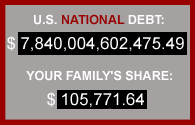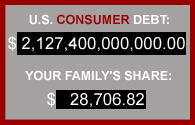

* Household debt clock represents total outstanding consumer credit (non-mortgage) as of July 8, 2005. Read the complete article
A lot of attention is being paid is being to the fact that Bush is going to get to appoint not one but two Supreme Court justices, and that he has a chance to fill the Chief Justice chair which could, theoretically, guide the direction of the court for decades to come (I say theoretically since Warren Burger turned out not exactly as Richard Nixon had planned).
I also say theoretically because the U.S. Supreme Court is a body of nine contentious, intelligent individuals, and while the Chief Justice guides the court, he’s still only one vote. While John Roberts, and the Justice to be named later, are getting a lot of ink and column inches, no one seems to be paying attention to the influence that Bush may be able to wield over the economy in the coming years.
Consider this for a moment:
Alan Greenspan took office June 19, 2004, for a fifth term as Chairman of the Board of Governors of the Federal Reserve System. Dr. Greenspan also serves as Chairman of the Federal Open Market Committee, the System’s principal monetary policymaking body. He originally took office as Chairman and to fill an unexpired term as a member of the Board on August 11, 1987. Dr. Greenspan was reappointed to the Board to a full 14-year term, which began February 1, 1992, and ends January 31, 2006. He has been designated Chairman by Presidents Reagan, Bush, Clinton, and Bush.
– Source: About the Board Members: Chairman Greenspan
Astounding, isn’t it, to think that in the past 18 years just one person has been in charge of the body that sets monetary policy for the United States? Even more astounding to think that we’ve done so well given that he was appointed by the first President to accumulate more debt than all of his predecessors combined.
The Federal Reserve, much like the Supreme Court, has a multi-member ruling body, in this case five governors including the Chairman and the Vice-Chairman, each of whom is eligible to serve multiple 14 year terms of office. Only the Chairman and the Vice-Chairman must be approved by the Senate. Of the current five governors, three of them appear to have been appointed by Bush (two taking office in 2001, the other in 2002) and with Alan Greenspan even hinting that he will retire and not accept another term, this means that Bush will have the chance to appoint the person who will wield a huge amount of influence on the organization that sets monetary policy for the U.S. for more than the next decade.
Why does this matter? The Federal Reserve is a major controlling factor on our economy, which is a huge influence not only on foreign policy (and to a lesser extent domestic policy) but also on our every day lives. Here’s how.
For the past few years interest rates have been kept extremely low by the Federal Reserve. This, in turn, has kept the U.S. dollar (as opposed to the Canadian dollar or the Australian dollar) weak overseas (right now it takes $1.80890 to buy one £1; $1.22160 to buy 1 EUR (see XE.com)). And while this has been good for the domestic economy – housing sales are booming, so much that some fear a housing bubble, because mortgages can be had for cheap, consumer spending has been up (though that may be changing) – it’s been bad for the economy in general because not only because foreign investors have stayed away (well, wouldn’t you stay away if you could put your money somewhere else and get more return on it?) but also because it’s an artificial hold, and like most things artificial, it can’t last.
The Federal Reserve raised interest rates this morning and it will be interesting to see what the impact is. Logic would dictate that we’re now headed for a recession (higher interest rates mean more foreign investment, yes, but they also mean depressed consumer spending as people who are paying more on all those interest-only adjustable rate mortgages they’ve gotten in the past four years and all those previously unbelievably low-interest adjustable rate credit cards have to pay more out for housing so they have less, theoretically (the issue of consumer debt will take many, many more words) to spend on consumer goods (like DVDs, clothing, CDs, and electronics that make up the staples of the coming Christmas buying season))
Hey! Wake up! Here’s why this is important: Do we really want a man who has run every business he’s ever managed – including, it looks increasingly, the Federal Government – into the ground determining who should set our country’s interest rates and monetary policy?
Do we really want the man who appointed Michael Brown to head up FEMA in charge of our money?